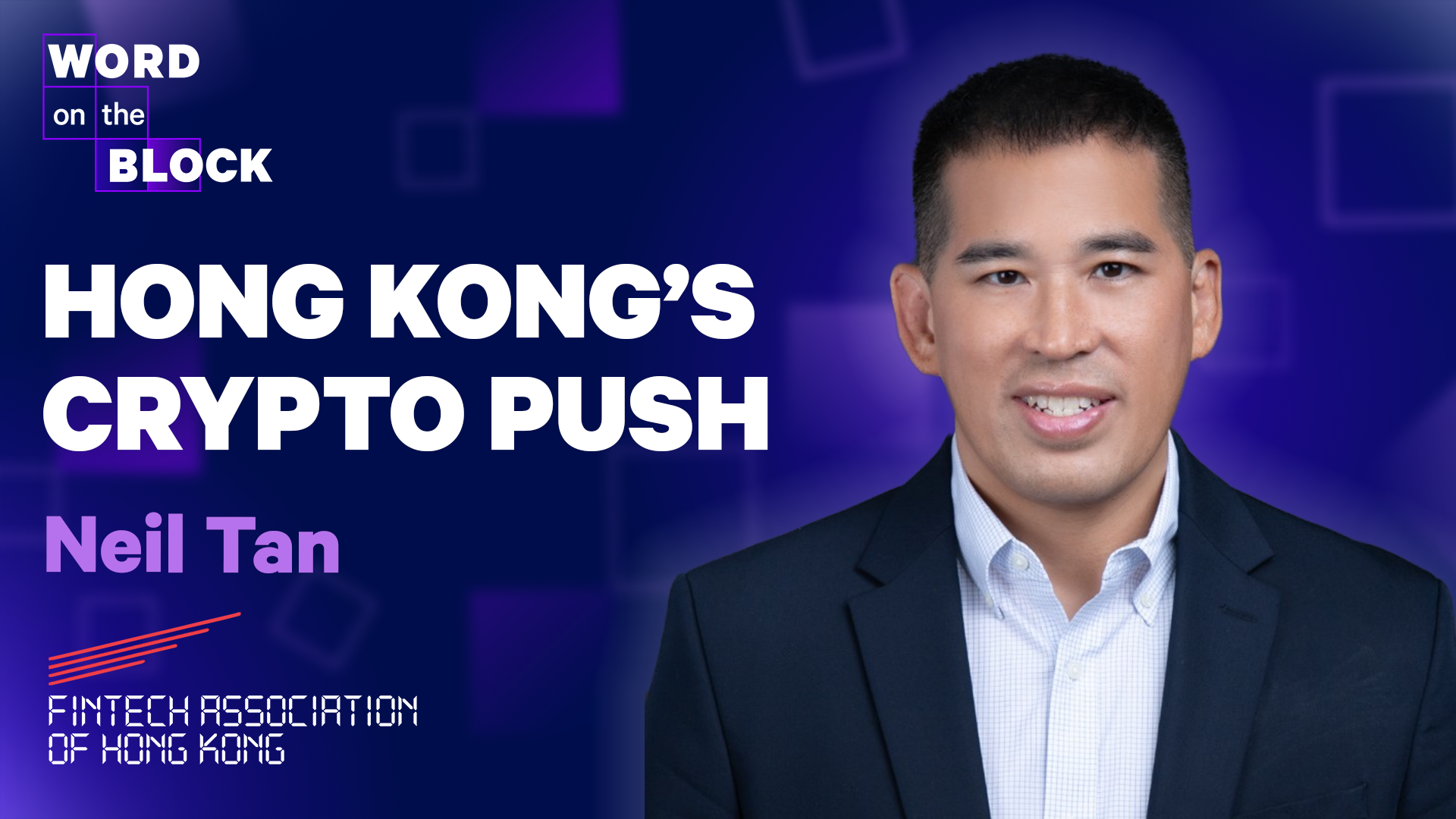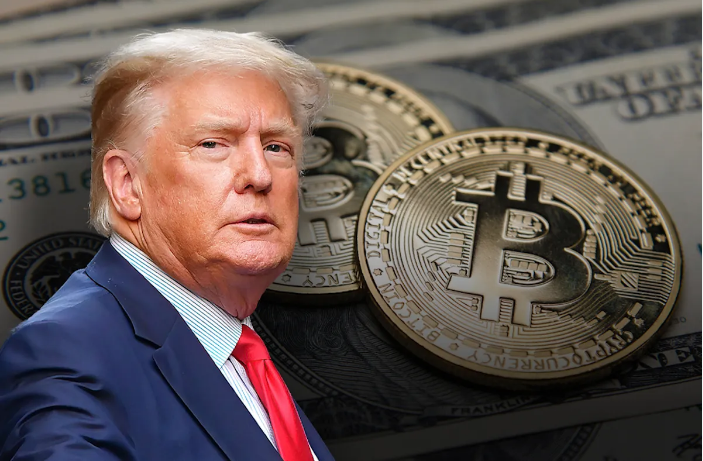Cryptocurrency firms are being driven to explore friendlier jurisdictions due to a challenging regulatory climate in the U.S., says Neil Tan, chairman of the FinTech Association of Hong Kong. The city’s strategic position as a gateway to China, combined with its robust access to capital, are strengthening its ambitions to become a leader in the virtual assets arena. However, Hong Kong faces stiff competition from Dubai and Singapore.
In a Word on the Block interview with Forkast Editor-in-Chief Angie Lau, Tan explains how the comprehensive rules set by the city’s Securities and Futures Commission — including the facilitation of retail trading while ensuring investor protection — have become key attractions for these firms.
Highlights
- Virtual assets hub ambitions: What’s happening in the other jurisdictions is there’s a pullback in terms of retail investor access. Hong Kong is going head first into this area. Of course, there’s investor protection inside the new regulatory framework, but the fact that we are actively going into this area is a telltale sign of where the future lies for Hong Kong as a virtual asset hub.
- Expanding license queue: The entire situation is almost like a benchmarking exercise to what we saw inside of virtual banking licenses. We’re going to see different players. Crypto and TradFi are coming in. There’s going to be a number of other applicants, including Greenland Holdings that is out of China. [Greenland Holdings] is a real estate participant that has no experience with crypto or digital assets, but they’ve indicated that they want to apply for the license.
- Crypto lessons from Hong Kong’s past: From a regulatory perspective, Hong Kong pulled back, saying that [it wants] to go for accredited investors [and] professional investors. But that significantly reduced the size of the market, especially if retail was not addressed. Many other jurisdictions also did the same thing. It wasn’t necessarily a net negative. Hong Kong put up those guardrails to ensure that they won’t have what other jurisdictions experienced with companies like FTX, Celsius, Three Arrows Capital and Terraform Labs.
- Does Hong Kong’s crypto stance have China’s blessings? Crypto is banned in China but it’s completely legal here. It’s a sandbox. It’s the access point for a lot of this cross-border activity. China has said this is the way that [they will] operate, and it seems like it’s been approved. So I think this is very well received.
- e-HKD use cases: If you’re talking about leveraging smart contract technology, this is what they’re trying to do. Aside from that, they’re looking at tokenized deposits and tokenized assets. They’re partnering with Fubon Bank, a Taiwanese bank, essentially for tokenizing real estate.
Transcript
Angie Lau: Hong Kong, once the epicenter of crypto activity, was home to leading crypto exchanges, including FTX, Bitfinex, BitMEX and AAX beside many others.
At one point, the city emerged as a vibrant playground for crypto and a bridge to the giant economic power that is China. Hong Kong had all the right ingredients: a global financial hub with the brightest minds and the perfect infrastructure to set up shop. Then in 2018, Hong Kong authorities sounded alarm bells on the risks and exposure that go hand in hand with the wild west perception of crypto ushering in regulatory winds of change.
Many exchanges at that point packed up their bags and migrated to friendlier jurisdictions like Singapore and Dubai. Just when the tension was mounting, the world was hit by the pandemic. But the story is far from over.
We pick it up right here.
Hong Kong remains an ever-evolving player in the digital asset space. The Securities and Futures Commission started accepting license applications from crypto exchanges starting this month once again, opening doors to Web3 players. The city also started a pilot of its central bank-backed digital currency, known as e-HKD, with high-profile partners such as Alipay, Bank of China, Visa and Ripple Labs.
So what does this all mean? Well, you can’t count out Hong Kong just yet. Let’s dive into all that is this special administrative region of China and what it’s doing for virtual assets.
On this edition of Word on the Block, the series takes a deeper dive into blockchain and all the emerging technologies that shape our world at the intersection of business, politics and economy. It’s what we cover right here on Forkast. I’m Editor-in-Chief and your host, Angie Lau.
There’re lots happening and who better to unpack it all for us than Neil Tan, chairman of FinTech Association of Hong Kong, who led a working group to respond to SFC’s virtual asset trading platform consultation. A lot of words, to mean they wanted your opinion from the industry perspective, Neil, and you gave it to regulators. It’s a really important part of that dialog and it’s great to welcome you on the show. I can’t wait to dive into all this.
Tan: Absolutely. Thanks a lot, Angie, for having me here.
Lau: Catch us up with what Hong Kong is doing, has done and has launched, June 1st.
Tan: The government issued a consultation paper back in February, March, 380 pages outlined and with the FinTech association as one of the respondents for that. We have about 30 to 35 members that participated in this working group that you mentioned earlier, of which there were four law firms, international law firms. From an association’s perspective, what we want to do is make sure that Hong Kong is competitive. Obviously, there are a number of different jurisdictions like Dubai and Singapore that are also inside the crypto or digital asset space.
Lau: That’s a really important distinction here. You didn’t want Hong Kong to be seen as a follower but wanted to be seen as a leader. Do you think that it’s getting there with this VASP regulation and also the trading platform regulation that allows retail investors to participate?
Tan: Yeah, absolutely. What’s happening in the other jurisdictions is there’s a pullback in terms of retail investor access. Hong Kong is going head first into this area. Of course, there’s investor protection inside the new regulatory framework, but the fact that we are actively going into this area is a telltale sign of where the future lies for Hong Kong as a virtual asset hub.
Lau: Did Hong Kong learn the tough and painful lesson? The retail consumer base was in Hong Kong. They were being served by a number of crypto exchanges a few years ago. And then the clampdown on specifically taking that access away from retail investors and giving crypto access to only accredited investors. Do you think that that was a painful lesson to learn?
Tan: China was one of the key innovators in crypto and many major projects and platforms came from China. And when China ended up banning it, it all migrated into Hong Kong. In China, there were a number of different millionaires and also even billionaires inside of the crypto space who ended up providing funding to projects and platforms. OKX and all these players ultimately migrated to other areas. From a regulatory perspective, Hong Kong pulled back, saying that [it wants] to go for accredited investors [and] professional investors. But that significantly reduced the size of the market, especially if retail was not addressed. Many other jurisdictions also did the same thing. It wasn’t necessarily a net negative. Hong Kong put up those guardrails to ensure that they won’t have what other jurisdictions experienced with companies like FTX, Celsius, Three Arrows Capital and Terraform Labs.
Lau: We’re kind of in the midst of writing the second chapter in the digital assets history book. And the one about Hong Kong is really interesting because right now, in the context of everything, some countries like the U.S. are cracking down on crypto very specifically. Others like Singapore banning retail trading. Hong Kong seems to be, as you said, setting the rules to ensure that businesses do get licensed and actually have a rule book to operate by. What’s interesting and certainly from your members at the FinTech Association is the perspective from even the crypto exchanges, financial firms and service providers in wanting to engage with crypto? Is this an opportunity to set that new standard, even for an international class of investors and service providers?
Tan: Hong Kong is an international financial center. If we take a look at the size of the opportunity, Hong Kong has over US$4.5 trillion in Assets Under Management. As a capital market, it’s number one in the last seven to 10 years in terms of IPOs. So what does that translate into? Number one is the allocation of that capital to crypto assets. There’s also liquidity, which is also a critical piece inside of crypto that a lot of people have challenges with, particularly inside of tokenization. If we’re moving into the real world asset tokenization space, this is going to be very key.
Lau: In contrast to what I’m watching happen in the U.S. right now because there is still this stink, if you will, and this hesitation and apprehension of participating in the crypto markets.
But when I went to Dubai and Hong Kong, the feeling was very much different. To be able to access crypto in a regulated way and and legally have access to it, that kind of ability to diversify into crypto assets, that’s a really powerful move that I think really speaks to the desire coming out of the Asia Pacific region.
Tan: Hong Kong in the last 3-4 months has had about 200 different Web3 events. There’s just electricity here. So it’s of massive interest. There’s a huge community and it’s just: how do we take this forward? I think there’s a level of excitement inside and getting this license in place. Devil’s in the details, of course. There’s implementation, execution and those different things are the next kind of order. Ultimately it’s a net positive for everyone, including the different ecosystems of Web3, crypto. We’re still at a very, very early stage. This is a very nascent industry at this point and there’s plenty of room to grow for everyone. It doesn’t necessarily mean that it’s going to be Hong Kong and that somebody has to win. The entire pie is just going to get bigger.
Lau: That’s right. Especially if you are welcoming people, AKA more liquidity in the market that is really just going to grow the industry. We’ve watched the enthusiasm right now of exchanges lining up to register in Hong Kong. What are they? OKEX, Huobi, DBS bank … a lot. You’ve got insights into the workings of SFC. Obviously, you know, I’m sure you’ve studied every one of those 380 pages, but from your educated guess based on what those applications look like and knowledge of the rules, when do you think we can expect the first licenses to be granted? Is this going to be a long extended thing or when do you think the landscape is going to change?
Tan: OSL and Hashkey already have the institutional license. The entire situation is almost like a benchmarking exercise to what we saw inside of virtual banking licenses. We’re going to see different players. Crypto and TradFi are coming in. There’s going to be a number of other applicants, including Greenland Holdings that is out of China. [Greenland Holdings] is a real estate participant that has no experience with crypto or digital assets, but they’ve indicated that they want to apply for the license. So we’re going to see a very diverse group coming out of this pool.
Lau: That is such a signal, right? If that is not a signal that China is allowing Hong Kong to be that sandbox, even though domestically within the borders of China, crypto is banned, crypto trading activity is banned. A mainland firm has indicated that it wants to participate. The fact that there is a public desire to do so because a lot of the companies in the mainland look to policy as guidance for business strategy. That’s just a huge signal.
Tan: There’s basically the diversity inside of the group as far as whether that’s actually tied to how China views this. Whether they’ll authorize the state-owned enterprise to apply, that’s another thing. I think they already said they’re interested in moving forward on this space and they haven’t received any pushback at this point. This bodes well and really is a showcase for the one country, two systems policy. Crypto is banned in China but it’s completely legal here. It’s a sandbox. It’s the access point for a lot of this cross-border activity. China has said this is the way that [they will] operate and it seems like it’s been approved. So I think this is very well received.
Lau: 100%. And of course, there’s something on the horizon as well. Hang on to that thought, Neil, because when we come back, I want to talk about two types of digital currencies hot on the minds of us and regulators and investors in Hong Kong. We’re talking about CBDCs and stablecoins.
We’re going to take a quick break right now. But when we come back, we’re going to be diving into the world of digital currencies and a whole lot more. Stay with us.
Welcome back to Word on the Block. I’m your host, Angie Lau. We’re going to pick things up right where we left off with Neil Tan. He’s chairman of the FinTech association of Hong Kong. Hong Kong has gone from the regulatory space and very interesting things are happening there. And I want to talk about stablecoins now because there’s there’s guidelines for stablecoins. It’s clear that the SFC is keeping a watchful eye on stablecoins, especially after the Terra-Luna incident, as we obviously all can remember. New guidelines say that stablecoins should not be admitted for retail trading until they are regulated. Give us some insights here.
Tan: It’s a huge step forward doing the VAT license as it is providing access to the retail investors. I think what they’re trying to do is really at this point, just stay with, you know, a large cap crypto. They’re also going to give access to altcoins or alternative tokens. All the platforms will have to do diligence themselves. The SFC will not. Those different tokens have to report back to the SFC. But stablecoins are not on the table at this point. The thinking here is to stick with crypto without opening up stablecoin access and at the same time launch the HKD. They’re running different pilots inside of HKD, inside the different CBDC programs and with different participants in that particular program. Around 16 different firms are in the pilot, including companies like Standard Chartered, HSBC, Bank of China. But there are other players like Visa, Mastercard, and Ripple. So I think that’s kind of the playbook that SFC is approaching with. How do they institutionalize the CBDC space and understand the different use cases that they will explore in this particular pilot.
Lau: The HKD pilot includes leading names such as Visa, Mastercard, Ripple Labs, even with Ripple engaged in litigation with the SEC in the United States. So that’s a very interesting differential there. With the HKD being pegged to the U.S. dollar, what do you see as use cases and potentially for a global economy?
Tan: This pilot is trying to test online and offline payments, and is working on different types of programmable payments. So if you’re talking about leveraging smart contract technology, this is what they’re trying to do. Aside from that, they’re looking at tokenized deposits and tokenized assets. They’re partnering with Fubon Bank, a Taiwanese bank, essentially for tokenizing real estate from what they had originally envisioned Ripple to do, which is pure play payments. But the tokenization of real estate is what they’re trying to explore in this pilot. It’s very interesting how one jurisdiction is in a legal battle with them and another is adopting them as a pilot use case. Very interesting times.
Lau: Super interesting to see institutionalized play into tokenized real estate. Approved tokens undergo strict due diligence, including a one year track record to catch the shady operators and protect investors. How do you see that kind of diligence being played out and how are Hong Kong regulators equipped to actually actively close potential loopholes in the ever changing crypto landscape?
Tan: The SFC will not go to the token levels at that point to authorize.The onus is going to be on the platforms to do that and they do still have to report to the SFC but it’s almost like a formality, assuming that they follow the right due diligence procedures. I think this opens opportunities for exchanges to diversify their offerings to the public. And some companies even plan to offer, for example, sand, because the sandbox is part of Animoca Brands and is a local favorite here. And that might give access to the retail investors to purchase and buy and hold that type of token. So, many folks are looking at this as a huge opportunity that will open up the space, but it comes down to implementation, execution, enforcement and so forth. How will the SFC enforce all the different regulatory frameworks inside of that space? It remains to be seen how all the audit and due diligence work out. We’ll see what happens once the licenses are issued and once others start applying for the tokens to be listed on their exchanges.
Lau: We recently saw incidents in neighboring countries to Hong Kong, like the token listing bribery case in South Korea. So I’m just wondering if local authorities like the SFC have an investigator, to be able to track and make sure that these things don’t happen in Hong Kong.
Tan: There’s two different ways of regulating in this context, particularly inside of Web3. At the top, there is the overarching legal framework or the regulatory and compliance framework, which the SFC has introduced. At the bottom, top down is really what that license is all about. How do we everage this technology to facilitate regulatory compliance? From a technical perspective, and that’s what the SFC plans to institutionalize, is the use of different smart contracts in the auditing process. If you’re talking about proof of reserves and they also have a provision that requires monthly reporting, all those things will be built onto the blockchain and into smart contracts so that it is not some arbitrary thing that you don’t see on Twitter.
Lau: So then the question, is it Dubai, Singapore or Hong Kong? We have a real close known leader in the EU. Potentially. Things are happening in London. Have we counted out the U.S.? The race to be the next Web3 leader is on. We’re going to take a quick break right now. But when we come back, we’re going to see if there will be a winner and who will win the crown for the next digital assets hub? Got to ask the man in the know, Neil Tan. Stay with us.
Welcome back. You are joining me, Angie Lau, on Word on the Block with Neil Tan. If I had a bell and I think we’re in the fifth round now, are we going on the sixth? The fighters are tired, but they’re still in it to win it. And it looks like Asia Pacific is picking things right back up, really geared to to engage with Web3 in a significant way, especially as we’re all watching a very unfavorable and chilling regulatory environment in the U.S. Is it driving crypto firms elsewhere, abroad and into the arms, if you will, of the Middle East, Asia or Europe? Where do you think is happening right now in terms of mood and migration?
Tan: The United States has already stated its position. It’s going after Coinbase and a number of other institutions and organizations. It’s quite clear on the direction. If you believe in the Operation Choke Point 2.0 concept that a lot of crypto participants believe in, then this is the direction that the U.S. is going and that’s unfortunate.
Lau: I’m just trying to weigh the pros and cons and trying to figure out, is there going to be one winner or is the jury still out?
Tan: Yeah, I don’t think that there will be one winner. Some hedge funds and family offices are establishing their presence in all of these different jurisdictions. There is going to be regulatory arbitrage. There will be product and proposition arbitrage that will come into play in this nascent industry. It is critical to ensure that Hong Kong can compete and commercialize this particular sector.
The way Hong Kong is positioned is in a much more holistic way, with three key factors. Number one is the International Financial Center. Whether it’s the US$4.5 trillion in AUM, capital markets topping the list for years, that is a huge advantage. That’s something that cannot be built in a year, 10 or 20 years. It’s built over decades. There’s a level of trust that the investor group has in Hong Kong and inside of the regulatory framework. The second factor is that Hong Kong has been positioned as an arts and cultural center for China. The last factor is support from the private and the public sectors. We have different government organizations like Cyberport and Hong Kong Science and Technology Park who are incubators in the space. We also have Invest Hong Kong, FSB, the Treasury Bureau that provide support in terms of policy and allocation of capital and resources to encourage such development.
Now, a key inside of the public and private is that private piece. And we have a global champion in Web3 based out of Hong Kong, which is Animoca Brands. Hong Kong’s advantage in developing as a global virtual asset hub to develop as a Web3 hub is at the top of the list because of this holistic strategy and approach in terms of development. So I’m very positive in that sense.
Lau: Neil, I don’t say that lightly. This was so insightful and I really appreciate you breaking down what is really a behemoth of regulatory policy and 380 pages worth of guidance and breaking it all down for us. And we’ve been gifted the audience by this insight.
Tan: Thanks
Lau: And that’s a wrap. Thank you everyone for joining us on this latest episode of Word on the Block. I’m Angie Lau. Forkast’s editor-in-chief. Until the next time.
Credit: Source link















































